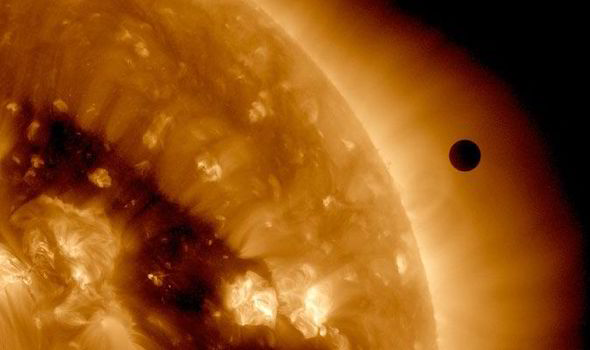SCIENTIST: THE WORLD IS BOUND TO END 1.75 MILLION YEARS TIME
SCIENTISTS have predicted that we have somewhere between 1.75billion and 3.5billion years until global warming wipes out life on planet Earth.

(PHOTO):The sun's gradual warming will eventually make the Earth uninhabitable (GETTY)
Researchers from the University of East Anglia's Department of Natural Sciences have predicted that, due to the rising temperature of the sun, after that point the Earth will no longer be habitable.
In order to be a 'habitable zone' - able to support life - a planet must be neither too hot or too cold for oceans to develop.
The scientists believe that Earth could expect to experience between 6.3billion and 7.8billion years of these 'Goldilocks' conditions, meaning that we only have a maximum of around 3.5billion left.
Andrew Rushby, who was involved with the research, explains: "After this point, the Earth would be in the hot zone of the Sun, with temperatures so high that the seas would evaporate.
"We would see a catastrophic and terminal extinction event for all life."
The team of astrobiologists studied seven planets to discover how 'habitable zones' will change over time and have spotted some which might be suited to supporting life after Earth reaches moves into the 'hot zone'.
Planets such as Kepler 22b, located approximately 600 light years from Earth in the constellation of Cygnus, will experience such conditions.
However, planets closer to smaller stars, known as red dwarfs, spend much longer in habitable zones. Gliese 581d, which orbits a red dwarf 20 light years from Earth is currently enjoying habitable conditions.

Researchers from the University of East Anglia's Department of Natural Sciences have predicted that, due to the rising temperature of the sun, after that point the Earth will no longer be habitable.
In order to be a 'habitable zone' - able to support life - a planet must be neither too hot or too cold for oceans to develop.
The scientists believe that Earth could expect to experience between 6.3billion and 7.8billion years of these 'Goldilocks' conditions, meaning that we only have a maximum of around 3.5billion left.
Andrew Rushby, who was involved with the research, explains: "After this point, the Earth would be in the hot zone of the Sun, with temperatures so high that the seas would evaporate.
"We would see a catastrophic and terminal extinction event for all life."
The team of astrobiologists studied seven planets to discover how 'habitable zones' will change over time and have spotted some which might be suited to supporting life after Earth reaches moves into the 'hot zone'.
Planets such as Kepler 22b, located approximately 600 light years from Earth in the constellation of Cygnus, will experience such conditions.
However, planets closer to smaller stars, known as red dwarfs, spend much longer in habitable zones. Gliese 581d, which orbits a red dwarf 20 light years from Earth is currently enjoying habitable conditions.

(PHOTO): Conditions for humans will become impossible to survive in much sooner (GETTY)
We would see a catastrophic and terminal extinction event for all life
Andrew Rushby, researcher
Mr Rushby said: "It is possible that there will be a habitable Earth-like planet within ten light years, which is very close in astronomical terms.
FOR MOBILE USERS!! are you tired of high rate of consumption of your data? WORRY NO MORE click the link below using your mobile browser (uc web or opera mini)
click the link below using your mobile browser (uc web or opera mini)
MOBILE VERSION
We would see a catastrophic and terminal extinction event for all life
Andrew Rushby, researcher
Mr Rushby said: "It is possible that there will be a habitable Earth-like planet within ten light years, which is very close in astronomical terms.
FOR MOBILE USERS!! are you tired of high rate of consumption of your data? WORRY NO MORE click the link below using your mobile browser (uc web or opera mini)
click the link below using your mobile browser (uc web or opera mini)
MOBILE VERSION
Labels: campus news, global, High school

0 Comments:
Post a Comment
if you don't have any ID please select "anonymous"
Subscribe to Post Comments [Atom]
<< Home